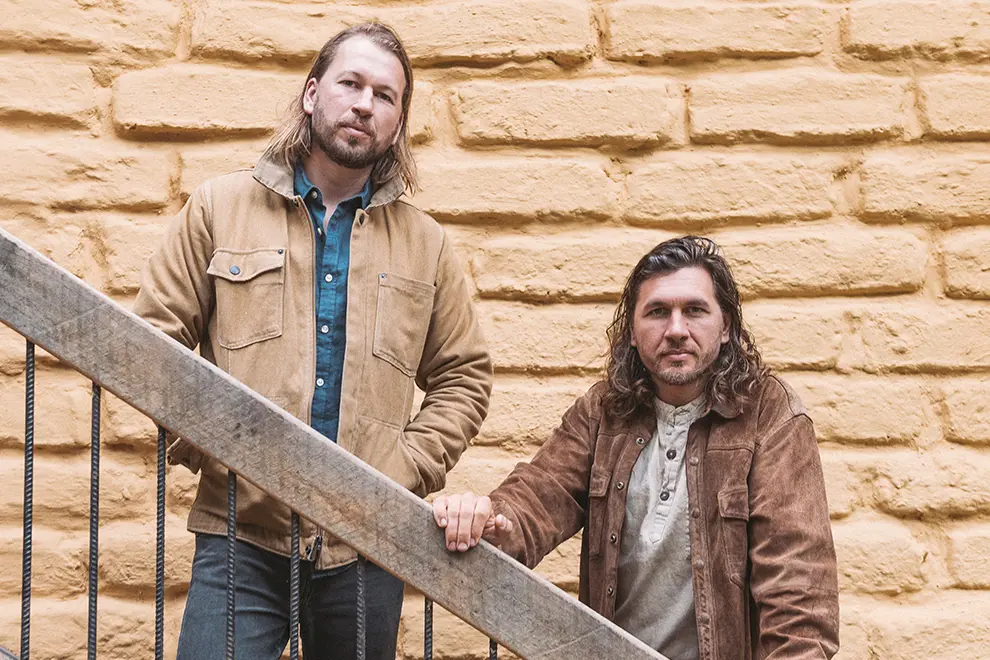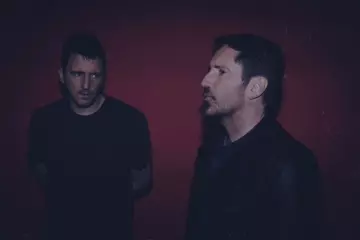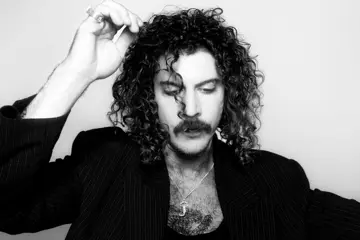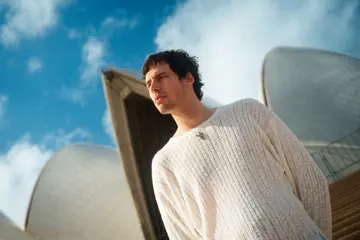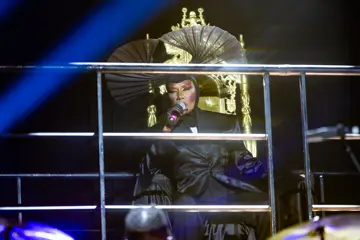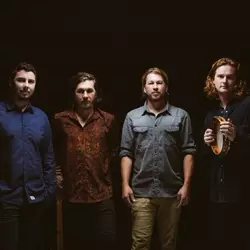 The Teskey Brothers
The Teskey BrothersA lot has changed since the last time The Teskey Brothers were gearing up to release an album. For starters, neither Josh or Sam are still based in the family’s formative stomping grounds of Warrandyte (a cosy mining town along the Yarra River, a short ways northeast of Naarm/Melbourne) – they call in remotely from the harbourside hub of Bristol, where Josh recently moved from a short stint in Portugal, and Sam from sleety Scandinavia.
In the months leading up to their second album, 2019’s Run Home Slow, the Teskeys were navigating a whirlwind rush of sudden acclaim. Tailing the success of their debut (Half Mile Harvest) two years earlier, they’d just signed to Mushroom’s Ivy League Records, won the coveted Levi’s Music Prize, and penned seven original songs for the Eora/Sydney-set dramedy Palm Beach. It was nothing short of sheer chaos – and that was only the start.
Run Home Slow was an instant hit, debuting at #2 on the ARIA Top 50 Albums chart and earning international praise. A slew of accolades followed: the Teskeys took three trophies home from the 2019 ARIA Awards (from a total of seven nominations), as well as four Music Victoria Awards (also from seven nominations), one APRA Award (from six nominations) and one National Live Music Award (from two), as well as bonus nods for two AIR Awards and one J Award. Finally, just last May, Run Home Slow was certified Gold by ARIA.
Despite its monumental success, The Teskey Brothers weren’t keen to make Run Home Slow 2: Run Home Slower. They instead completely upended their creative process heading into album number three – a stately and cinematic statement piece called The Winding Way – starting with the closure of their near-iconic home studio, Half Mile Harvest.
Don't miss a beat with our FREE daily newsletter
“It was what we needed to do in order to move forward,” Sam tells TheMusic, wistfully reminiscing on the years he, Josh and all their misfit mates spent shredding up a storm in those hallowed halls. The studio was built in the basement of the brothers’ family home in Warrandyte, which in addition to being what Sam describes as “a haven for creativity and self-expression”, has strong ties to the Teskey lineage: Sam and his son were both born in the same room of the house, as was Josh’s first son.
But all good things must come to an end, and as life kept taking the Teskeys in all manner of new directions, shutting down the Harvest was a tough decision that had to be made.
“I found myself being the last one standing there,” Josh says. “During the recording of Half Mile Harvest, there were something like ten of our musician friends living there with us, jamming out and drinking late into the night, every night for about a month. But as you grow older, things just change, you know? You start having things like families and real commitments, and by the end it was just me, bringing my own family up on the property. And we’ve always been the more nomadic type, so to stay stagnant and try to cling onto our pasts by staying there... It would’ve just been sad.”
Therein lies the nucleus of The Winding Way: the idea that although change is inevitable, it shouldn’t be seen as scary or avoided. The record is about “saying goodbye to your former selves”, Josh says, and embracing what lies ahead. But that doesn’t mean the past can’t also be honoured: Winding Way is the name of the street on which the Teskeys’ old family home was situated, and as Josh further explains, the record’s opening track (I’m Leaving) was written as “a way for us to say goodbye to this part of our journey”.
He continues: “It’s about stepping out from what we’d always known as ‘home’ and setting out on a new journey, finding our own paths and seeing what lies ahead... That’s this whole record, really. And so to actually make the record in a new environment, it was a really, really freeing thing.”
With the shift in scenery came an adjustment to The Teskey Brothers’ personnel: last November, the pair announced that founding bandmates Brendon Love (bass) and Liam Gough (drums) would be leaving the fold. They wrote in a joint statement shared at the time: “As rhythm section they have been the backbone of the band, holding down a tight groove and helping to shape our sound... This year we decided to bring it back to where it all began, just the two of us brothers making the music we love.”
Josh says that while he and Sam both adored working with Love and Gough, “nothing really changed” as far as their writing process was confirmed. “We did things the same way,” he explains: “We wrote everything at home, put all these rough little ideas together, and then worked them out as brothers. And then once we’d had something we were happy with, we’d go, ‘Alright, let’s take it to the rhythm section.’ The only real difference was who played in that rhythm section, and this time around we had a little bit of variety there. And that bigger clientele of musicians probably added slightly to that more ‘cinematic’ sound.”
“We were always open to the idea that a song should go wherever it should go.”
Also instrumental – no pun intended – was producer Eric J Dubowsky, who added a suite to new colours to the Teskeys’ palette by virtue of his genre-hopping portfolio: though Sam asserts that “soul music is one of his biggest passions”, Dubowsky is best known for his work with acts like Flume, Ruel, The Rubens and Chet Faker. Josh and Sam moved to Eora for the process, joining forces with the Grammy, Emmy, ARIA and APRA Award-winner at the legendary Hercules Street Studios.
According to Sam, the years Dubowsky has spent working with pop and dance artists gave the Teskeys a chance to explore some new territory. “We’ll always create the sound that we create – that just comes very naturally to us,” he explains, “so I think it was really important to have someone who could stir the pot a little bit. And that’s exactly where Eric came in. And it was great, because obviously he’s had a lot of success doing a lot more electronic pop stuff, but he still has such an amazing ear for soul and blues music.
“We found that Eric having all of those influences helped him push us to be a bit more experimental. And it was good to take things in some interesting directions – you know, you've got to get yourself lost to know where home is.”
The collaboration marked a natural progression of the Teskeys’ ever-flourishing ethos as it pertains to the recording process. “If you look at all our records one-by-one,” Josh adds, “you’ll see this very clear ‘evolution’ of sorts. Half Mile Harvest was pretty much just us in the room with the band, and then on Run Home Slow we had Paul Butler working with us. He did a lot more of the mixing and production, but you know, we were on a bit of a time-crunch so we didn’t really get to do as much as we’d hoped with him.
“This is the first time we’ve had a producer work with us from day one, right from the start of the songwriting process, and that meant Eric was able to really influence what the core of a track was going to be. I think he really brought some of these songs to life, just by adding in his element and giving us some ideas we normally wouldn’t come up with on our own. ”
In the spirit of growth, both creative and personal, the Teskeys made a conscious effort to be less precious about what one of their songs should and/or shouldn’t sound like. “We were always open to the idea that a song should go wherever it should go,” Sam says, adding that it was crucial he and Josh “didn’t discriminate on any ideas” that came up between themselves or Dubowsky.
The end result is a record studded all over with magical, mind-bending sounds and sonic concepts, from the heartwarming harmonies on Oceans Of Emotions and Carry Me Home to the roaring horns in Remember The Time, right to the soaring string crescendo on Take My Heart and Floydian guitar solo on Blind Without You.
Particularly bewitching are all of those orchestral flourishes sprinkled across The Winding Way. Those came courtesy of Philadelphia-based maestro Larry Gold, best known for his work with the likes of Lizzo, Kehlani and Kid Cudi. Sam attests that Gold’s work on The Winding Say sounds “so raw and so beautiful”, which gelled perfectly with their overarching modus operandi: “We didn't want to lose too much [of The Teskey Brothers’ sound] from the past, but we didn't want to stay in the same pocket we were in on Run Home Slow either.”
Josh chimes in to stress that he and Sam “never have a definitive vision, at the start of the songwriting process, of what a record is going to sound like”. Rather, he says, “It's always just about taking each song and doing right by it individually.”
He expounds on the sentiment: “The subject matter is the most important thing – we wanted this album to have that one thematic through-line that really tells a story. But as far as the sound goes, we just tried to make the best decisions on a song-by-song basis, asking ourselves, ‘What does this song need? What sounds right for this song?’ And something that sounds right for one song might completely ruin another one.”
Sam offers the tongue-in-cheek analogy that he and Josh “always liken [their] songs to children” because “they’re all individuals and they’ve all got their own unique quirks”. It can be a tough process – with many hard decisions made – but at the end of the day, it all comes in the pursuit of quality.
The nod to songs as “children” is fitting, too, given that Josh and Sam are both full-time family men, and over the four years separating Run Home Slow and The Winding Way, they welcomed three new Tiny Teskeys. Josh and his wife Hannah welcomed their first daughter, Ayva Rae, in May of 2020 – followed by their first son, Romy, in August of 2021. Sam and his wife April, on the other hand, welcomed their first daughter, Arjuna, in May of 2021.
It’s commendable the brothers even found time to smash a new record out amid all the turbulence of child rearing, but as Josh notes, they didn’t have to shuffle too much around – rather, they weaved their parenting duties into the record-making process itself. “We just embraced being dads while we made the album,” he says, beaming as he rifles through memories. Over the year they spent hashing out The Winding Way, he and Sam came to a vital realisation, “that you can be a musician and a dad – or a mum – without having to sacrifice your passion for either role”.
“We want it to sound like a real band, you know? Like you can close your eyes and feel like you’re sitting in the room with us while we’re playing all these songs together.”
The process began last February with a handful of loose, formative brain jams. “I’d be over at Sam’s place or he’d be over at mine,” Josh says, “and we’d just kind of sit down and try to knuckle out these songs while our kids were playing in the background. Rather than saying, ‘Okay, nah, we’re artists, we need to go off and find a space to do this in isolation,’ we just did all the same shit we normally do in the spaces we shared with our families. We’d go out to the garden and work on stuff, or we’d muck around with songs in the living room.”
Once they had the songs demoed out, Josh and Sam had their families join them in relocating to Eora, where they both moved into houses “just up the road from the studio”. That encouraged them to be less intense with the recording process, Josh continues: “Rather than doing these huge all-nighters and saying, ‘We’re making a record, we have to be in here all the time,’ it was like, ‘Nah, you know what? I’ve got kids to look after.’
“So we'd come in at a reasonable hour, work on the songs until 12 o’clock, and then I’d take a break to go home and put my daughter down for a nap – then we’d go back in and keep working on the songs. It definitely slowed us down, but it worked out for the better; it gave us a chance to let these songs breathe a little more than we normally do.”
That, in part, ended up shaping the album’s denser and more expansive sound – something Josh says makes listening to The Winding Way a unique experience: “If you listen really deeply, you can sort of challenge yourself and go, ‘Okay, I can focus in on this, I can lose myself in these songs.’ But it’s also just a classic sort of record that you can put on in the background when you have some people over, and it just feels cool to listen to.”
For his part, Sam hopes that fans are able to “visualise the musicians on the other end of the speaker” when they first listen to the record from cover to cover. “We want it to sound like a real band, you know? Like you can close your eyes and feel like you’re sitting in the room with us while we’re playing all these songs together.”
The Winding Way is out June 16 via Ivy League Records.
THE TESKEY BROTHERS
AUSTRALIA + NEW ZEALAND TOUR: NOVEMBER 2023 – FEBRUARY 2024
Saturday November 18 – Kaurna/Adelaide, Hindley Street Music Hall
Friday November 24 – Gimuy/Cairns, Performing Arts Centre
Saturday November 25 – Thul Garrie Waja/Townsville, Entertainment & Convention Centre
Friday December 1 – Eora/Sydney, Hordern Pavilion
Saturday December 2 – Naarm/Melbourne, Sidney Myer Music Bowl
Friday December 8 – Tāmaki Makaurau/Auckland, Town Hall
Saturday December 9 – Te Whanganui-a-Tara/Wellington, Michael Fowler Centre
Tuesday December 12 – Ōtautahi/Christchurch, Town Hall
Saturday December 16 – Meanjin/Brisbane, Riverstage
Friday January 12 – Boorloo/Perth, Red Hill Auditorium
Friday January 19 – Garramilla/Darwin, Entertainment Centre
Saturday January 20 – Ngambri/Canberra, Canberra Theatre
Friday February 2 – nipaluna/Hobart, Odeon Theatre
Tickets: frontiertouring.com

